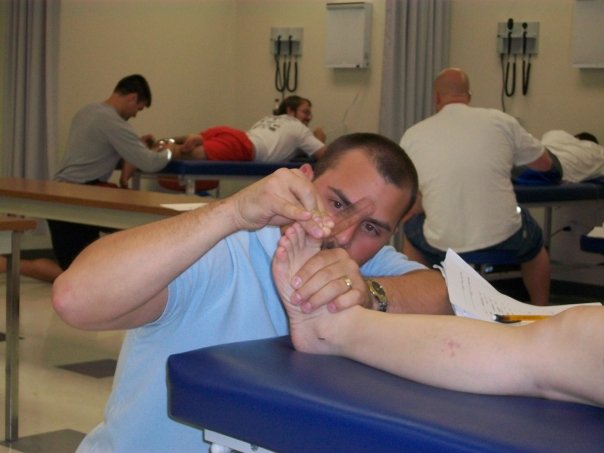This article looks at the issues faced by Allied Health Professionals (AHPs) in Northern Ireland in supporting patients in primary and community care. It sets out the groups that make-up AHPs and examines how the role of AHPs could evolve in a changing healthcare landscape.

More detailed information on all of the issues raised in this article can be found in RaISe published paper 86-/16, ‘Allied Health Professionals: Their role in healthcare reform and developing primary and community care’.
Allied Health Professionals are autonomous healthcare professionals who assess, treat and discharge patients through a range of pathways in both primary, community and secondary care settings. Each profession has a ‘protected’ title and is regulated by the Health and Care Professions Council.
Interventions from AHPs enable patients to recover movement and mobility, overcome visual problems, improve nutritional status, develop communication and everyday living skills. These interventions often allow patients to return to work, return home from hospital, or remain in their own homes and out of formal care settings, and to sustain and enjoy quality of life.
The Allied Health Professions (AHPs) in Northern Ireland consist of 12 distinct and unique disciplines. The seven main AHPs in Northern Ireland are Dieticians, Occupational Therapists (OTs), Speech and Language Therapists (SLTs), Orthoptists, Physiotherapists, Podiatrists and Radiographers, and each profession has a key role to play in the delivery of healthcare.
Art Therapists, Drama Therapists, Music Therapists, Orthotists, and Prosthetists are also AHPs. In the rest of the UK paramedics are also recognised as AHPs, but this is not yet the case in Northern Ireland.

AHPs and healthcare strategies
Since 2005 a number of strategies and reports have been published aimed at transforming delivery and governance of health and care services in Northern Ireland and refer to the role of AHPs:
- Caring for People Beyond Tomorrow (2005) was a 20-year strategic framework for primary care in Northern Ireland. It recognised the need for wider development of community-based alternatives to hospital admission and proposed enhanced primary care services delivered by GPs with a special interest, nurses and AHPs.
- Transforming Your Care (2011) (TYC). TYC proposed community-based clinics where patients could access a range of services, including from community pharmacy, AHPs (such as podiatry and physiotherapy), nursing care, social work support, as well as from GPs and hospital specialists. The ‘Integrated Care Partnerships’ have made progress with this work at a local level, including support for the role of AHPs in secondary prevention, particularly for older people. For example, the role of podiatry in falls prevention, and the role of Occupational Therapy (OT) in rehabilitation.
- A more recent review of Primary Care Services (2016) noted the importance of GPs and other professionals (including AHPs) to work together as part of highly skilled, multi-disciplinary general practice teams.
- The recent Expert Panel report and subsequent Department of Health report, Health and Wellbeing 2026 (2016), refer to the role that AHPs will play in the population health model and in the primary care based multidisciplinary teams. Particularly highlighted is the need to move to a model of multidisciplinary teams embedded in general practice. The teams will include GPs, pharmacists, district nurses, health visitors, AHPs, social workers, and new roles as they develop, such as ‘Advanced Nurse Practitioners’ and ‘Physician Associates’. It is planned that additional funding for primary care will be focused on developing these multidisciplinary teams, including funding to test the impact that specialist AHPs, such as Physiotherapists, can have when working alongside the primary care team.
AHPs have been consistently highlighted as having a key role to play in making these reforms a reality.
The 2012 AHP strategy
In 2012 a specific five-year strategy for AHPs in Northern Ireland was published – ‘Improving Health and Well-being Through Positive Partnerships: A Strategy for the Allied Health Professionals in Northern Ireland’. The exemplars in the strategy show how AHPs were meeting and planning to meet the key health reform objectives of prevention, early intervention (linked to easing pressure in primary care) and helping to avoid hospital attendance and admission.
Issues facing AHPs in Northern Ireland
During the 2011-16 mandate, the Health Committee heard from a number of stakeholders who emphasised the importance of AHPs in the delivery of care and the potential challenges facing them.
As part of its scrutiny of TYC the Committee heard from the Allied Health Professions Federation (AHPF) who highlighted the role of AHPs in transforming delivery of care:
- AHP-led clinics and self-referral for muscular skeletal and back pain. Pilots began in the South Eastern HSC Trust in 2015, whereas across the other jurisdictions of the UK a substantial percentage of patients already have access to full self-referral;
- Enabling people to remain at home (out of formal care) or return home from hospital. For example, OTs providing aids/adaptations to prevent falls in the home and improved management of pneumonia by AHP/SLT assessment of swallowing. In addition, SLTs assessing swallowing may mean the difference between someone being able to leave hospital or not; and
- Economics of using AHPs – they are trained to degree level (a postgraduate structure allows specialism), with skills in managing – dysphagia (swallowing difficulties), diabetes, podiatric surgery, medical prescribing and back care.
The AHPF noted a number of challenges for AHPs. It highlighted that AHPs are not strategically positioned at a suitable level in the HSC Trusts to influence senior decision-making. In addition, paramedics are not recognised as AHPs in Northern Ireland and are not playing as full a role as they are in other parts of the UK, such as advanced care paramedics and community paramedics running minor injury units.
In separate evidence to the previous Health Committee, the Royal College of General Practitioners expressed the need to look at innovative ways of working, including the use of AHPs, new ways of referral and direct access to physiotherapy for musculoskeletal problems, such as acute back pain. This would allow GPs more time to deal with patients with multiple complex conditions.
The British Medical Association also highlighted the need for a ‘repertoire’ of staff in primary care practices, such as mental health workers, pharmacists, physiotherapists and nursing staff to take pressure off GPs.
The wider UK experience and the way forward
Other key UK reports have highlighted similar visions of reform. For example, The Primary Care Workforce Commission (England) identified models to meet the future needs of the NHS. Its report, The Future of Primary Care – Creating Teams for Tomorrow (2015) highlighted a vision for a wider range of disciplines in primary care – GPs, nurses and administrative support, with teams including AHPs, healthcare assistants, physician associates, paramedics and social workers.
The Nuffield Trust examined how best staffing could be re-organised to support new ways of delivering care. Its report (2016) found that equipping the existing non-medical workforce with additional skills is the best way to develop the capacity of the workforce, allowing aspects of GPs work to be taken on by other health care professionals such as nurses or AHPs.
However, the Nuffield report acknowledged challenges for developing extended roles for staff (including for AHPs), such as risks of duplication of work; patient, staff, GP and senior management buy-in; time and money needed to develop new extended roles; the difficulty of determining true cost savings to the health sector; and issues around regulation and insurance for new extended roles.
In recent years the argument has been well made in Northern Ireland that AHPs have a key role to play in the reform agenda working in multi-disciplinary teams, both in secondary and primary care. AHPs have highlighted the good practice that they bring including self-referral, support for seven-day working, reablement and rehabilitation.
There are, at present, no specific proposals for the structure and operation of the primary care multidisciplinary teams referred to in Health and Wellbeing 2026. Although, in a first step towards such teams, over the past year recruitment has taken place for Lead and Practice Based Pharmacists for a range of GP Federations. By 2020 it is intended that there will be over 300 (whole time equivalent) practice-based pharmacists in post.

